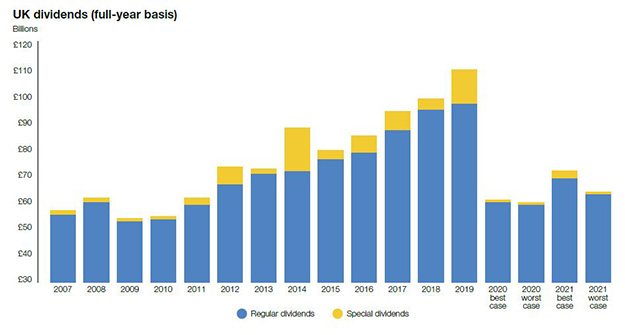
UK dividend payouts in the third quarter were the lowest in 10 years, according to the latest Link Dividend Monitor, but this is still an improvement on the second quarter when dividend cuts were at their peak.
Including special dividends, Q3 payouts were nearly 50% below those of 2019 at £18 billion, which was the lowest since 2010 in the aftermath of the financial crisis – but that compares with the near-60% slump in dividends in the second quarter, when companies such as Shell slashed payouts. Excluding specials, payouts in the most recent three-month period were down just over 45% to £17.7 billion.
For UK investors, there have been some promising signs in recent months – Britain’s biggest supermarket Tesco (TSCO) announced a 20% increase in its dividend along with first-half results and a number of FTSE companies have restored dividends, including car insurance giant Admiral (ADM) and FTSE 250 housebuilder Bellway (BWY).
When Link surveyed UK dividends in early April, the firm said that under a worst-case scenario dividends would more than halve to below £46 billion this year, but the figure is now likely to be around £60 billion in both best and worst-case scenarios in 2020 (£59.9 billion versus £60.4 billion).
““UK plc is not out of the woods, but the trees are perhaps thinning a bit. Our worst-case scenario has steadily improved all year and though UK investors face a historic decline in their income this year, the worst is now behind us,” says Susan Ring, Link’s chief executive of corporate markets.

2021 Forecasts
While there is still huge uncertainty for companies and consumer, she sees a bounceback in dividend payments, but much depends on whether UK banks are allowed to resume payouts by regulators. In April this year the Prudential Regulation Authority (PRA), an arm of the Bank of England which oversees UK banks and building societies, asked banks to suspend dividends and share buybacks until the end of 2020. Of the £14.5 billion in cuts in the third quarter, banks accounted for 40% of these, Link says, while oil companies represented 20% of the slashed payouts.
Given such a huge economic dislocation this year, it would be unrealistic to expect UK dividends to return to the £100 billion level (£110 billion including specials) seen in 2019. But Link forecasts a £70 billion payout to investors next year under a best-case scenario and just over £60 billion under a worst-case scenario, which would take dividends back to a level seen in 2012 and 2013.
This year has forced UK dividend investors to rethink their portfolios, says Joe Healey, investment research analyst at The Share Centre, especially with more than half of the FTSE 100’s payouts coming from 10 companies. Even before Covid-19, some of these dividends were looking unsustainable, Healey says, and that one positive to come out of the crisis is that payouts have now been re-set to more realistic levels.
“Investors may start to move away from the traditional income payers and towards companies that have more sustainable and less-disruptive longer-term futures which are cash-generative, thus having the ability to sustainably grow dividends into the future.”
Recently we asked fund managers such as Job Curtis, who heads up the Gold-rated City of London Trust, where else they are looking for income amid this year's dividend drought.
David Smith, manager of the Henderson High Income Trust (HHI) says that even after the dividend cuts, equities are still yielding much more than other rival asset classes.
"A market dividend yield of potentially 3.6% next year is still at a significant premium to the yield on most other global equity indices and much more than a savings account or fixed interest investment can offer currently.”










.jpg)


















